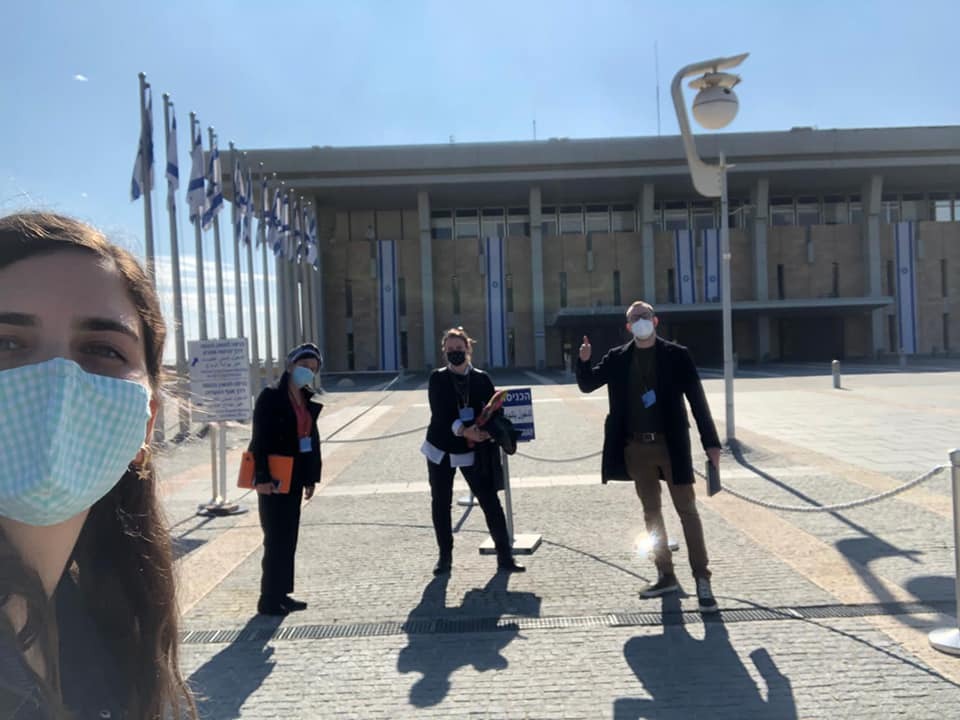“The Clinic for me was an opportunity to integrate theory and practice and experience for the first time practical legal work… While in class we learned about the legal rights of children and youth and the surrounding legal issues raised; at the ongoing practical work we learned how to implement these issues. With Shiran's close supervision, we managed to get a taste of the practical work involved in policy change and dealing with legal cases of minors".
Student in the Rights of Youth at Risk Clinic

The Rights of Youth at Risk Clinic works to promote the rights of at-risk children and youth in Israel. The Clinic provides individual legal aid and representation, runs education and empowerment programs for children and at-risk youth, and engages in ongoing policy change and legislative reform work that stem from various pressing needs and issues raised by the children and youth whom the Clinic’s students encounter in their fieldwork.
The Clinic runs two main projects. Through the Street Law Program, students lead a year-long weekly workshop for youth at risk, exposing them to the legal system, including citizens’ rights and obligations. The Representation of Children and Youth Project offers representation to children and youth who require legal assistance in various civil actions based on insurance claims, National Insurance Institute rights, foster care and adoption issues, as well as criminal charges. Students manage all elements of the cases except for actual court representation performed by the clinical attorney, including emotional help referrals and assistance with housing, employment, education, welfare and other issues. In addition, the students engage in policy-level projects to assist child and youth victims.
Among the Clinic's recent achievements:
-
Following an appeal by the Rights of Youth at Risk Clinic, there was a change in Ministry of Welfare procedures regarding payment for ambulance services for minors not living in the parental home, with the amendment requiring the boarding school or care home to cover the costs. This change stemmed from a case brought on behalf of a minor whose parents received three different payment demands for ambulance calls from a care home to take a minor to hospital.
- Following the High Court appeal by the Rights of Youth at Risk Clinic, together with the College of Law and Business in Ramat Gan and the Makom Association, procedures regarding quarantining for minors returning to boarding schools were changed. The clinic submitted a petition to the Supreme Court demanding that at-risk youth be allowed to return to boarding schools. These schools were closed for the Purim vacation, and their residents were told not to return to the schools due to the Coronavirus. Later on, they were allowed to return but only under unreasonable quarantine conditions, which meant that most did not return and some even lived on the streets. As a result of our petition, the Ministry of Education changed its order, which meant that the youngsters were able to go back to the boarding schools
-
Change in procedure for issuing IDs for at-risk minors. From various requests to the Clinic it became apparent that minors who are not in contact with their families or whose parents refuse to help them for various reasons, cannot be issued ID cards. This is because ID cards are issued contingent on a parent being present or a photocopy of a parent’s ID provided. The Clinic, with the assistance of MK Yousef Jabareen, contacted the Population and Immigration Authority of the Ministry of Interior to request that the regulation be amended so that minors can be issues an ID without the involvement of their parents. The procedure has been amended accordingly.
-
Examination of reports of physical force and violent restrictive methods at residential care facilities; and of lack of staff supervision. The Clinic submitted a request to the Minister of Labor, Welfare and Social Services, the director-general of the Ministry, and the supervisor of residential facilities, to examine the implementation of the Youth Regulations of 2014 (Conditions for the Detention of Minors in a Day Care Center or a Locked Day Care Center) regarding restrictive therapeutic holding as well as the supervision of residential facilities where young people are held.
The request stemmed from complaints by several young people living in secure residential facilities that physical force was used on them, apparently in violation of the rules regarding restrictive therapeutic holding. In response to a request submitted under the Freedom of Information Act, the Clinic learned that, in practice, 50% of counselors in state residential facilities were not trained to use restrictive therapeutic holding. The Clinic also learned that, in violation of the 2014 regulations, there was no external supervision of the facilities and that the directors of the facilities were appointed supervisors. The Clinic submitted another request to the Ministry of Labor, Welfare and Social Services, and we are currently awaiting their response. - The Clinic is assisting a minor in care and supervision procedures. The minor was in the Atnachta youth shelter, then transferred to a closed shelter for boys in “Neve Horesh” and then moved back to Atnachta. The Clinic represented him in court and at planning, care and evaluation committees. In light of the minor’s complicated mental health situation, and his soon-approaching 18th birthday, there is a risk that there will be no suitable institution to continue to care for him. The Clinic is now working to secure abandoned child benefits for him, and hopes that it will be able to find a suitable framework for him when he is no longer a minor.


